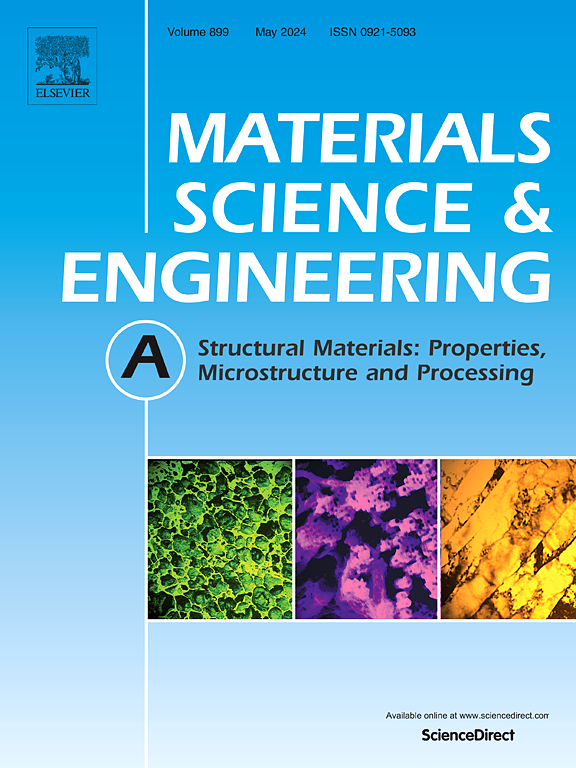揭示微偏析对添加剂制造的因钢材 718 蠕变断裂行为的主要影响
IF 6.1
2区 材料科学
Q1 MATERIALS SCIENCE, MULTIDISCIPLINARY
引用次数: 0
摘要
本研究的重点是揭示热处理周期变化导致的微偏析和微结构改变对添加式制造的铬镍铁合金 718(AM-IN718)蠕变断裂行为的主要影响。生产出的两种微观结构变体在再结晶晶粒的比例上有所不同,同时不存在δ相。典型的热处理(HT)循环包括在 980 ℃ 下对坯料进行应力消除,然后在 1080 ℃(STA1080,部分再结晶的微观结构变体)或 1150 ℃(STA1150,完全再结晶的微观结构变体)下进行固溶处理,以及双重时效(在 720 ℃ 下浸泡 8 小时并随后进行炉冷,然后在 620 ℃ 下浸泡 8 小时并进行空冷)。通过相关显微镜对两种微结构变体进行的详细微结构表征显示,STA1080 比 STA1150 普遍存在富铌无沉淀区(PFZ)。两种微结构变体在 625-675 °C 温度范围和 500-750 MPa 条件下的蠕变表征表明,STA1150 的抗蠕变性更优。动力学分析和全面的变形后微结构表征的相关性表明,晶界空化是主要的破坏/软化机制,也是两种微结构变体之间蠕变断裂行为不同的原因。长期暴露热处理方法表明,PFZ 是造成微偏析依赖性蠕变断裂行为的主要影响因素。有趣的是,尽管 PFZ 中的δ相通常对抗蠕变性不利,但在蠕变过程中,δ相的存在似乎延缓了空腔凝聚和破坏。本文章由计算机程序翻译,如有差异,请以英文原文为准。
Unravelling the dominant influence of microsegregation on creep rupture behaviour of additively manufactured inconel 718
This investigation focuses on unravelling the dominant influence of microsegregation and microstructure altered due to heat treatment cycle variation on creep rupture behaviour of additively manufactured Inconel 718 (AM-IN718). Two microstructural variants differing in the fraction of recrystallized grains while -phase being absent, were produced. A typical heat treatment (HT) cycle includes the stress-relieving of the as-built specimens at 980 °C, followed by solution treatment at 1080 °C (STA1080, a partially recrystallized microstructural variant) or 1150 °C (STA1150, a fully recrystallized microstructural variant), and double ageing (soaking at 720 °C for 8h and subsequent furnace cooling, followed by 8h at 620 °C and air cooling).
Detailed microstructural characterization of two microstructural variants through correlative microscopy revealed a prevalent existence of Nb-rich precipitate-free zones (PFZ) in STA1080 than in STA1150. Creep characterization of the two microstructural variants in the temperature range of 625–675 °C and at 500–750 MPa demonstrated superior creep resistance in STA1150. The correlation of kinetic analysis and comprehensive post-deformation microstructural characterization suggests grain boundary cavitation as the main damage/softening mechanism and the reason for the difference in creep rupture behaviour between the two microstructural variants. The long-term exposure heat treatment methodology demonstrates that PFZs are the major influencing factor responsible for microsegregation-dependent creep rupture behaviour. Interestingly, the presence of the phase within PFZs appeared to retard cavity coalescence and failure during creep, despite its usual detrimental role in creep resistance.
求助全文
通过发布文献求助,成功后即可免费获取论文全文。
去求助
来源期刊

Materials Science and Engineering: A
工程技术-材料科学:综合
CiteScore
11.50
自引率
15.60%
发文量
1811
审稿时长
31 days
期刊介绍:
Materials Science and Engineering A provides an international medium for the publication of theoretical and experimental studies related to the load-bearing capacity of materials as influenced by their basic properties, processing history, microstructure and operating environment. Appropriate submissions to Materials Science and Engineering A should include scientific and/or engineering factors which affect the microstructure - strength relationships of materials and report the changes to mechanical behavior.
 求助内容:
求助内容: 应助结果提醒方式:
应助结果提醒方式:


